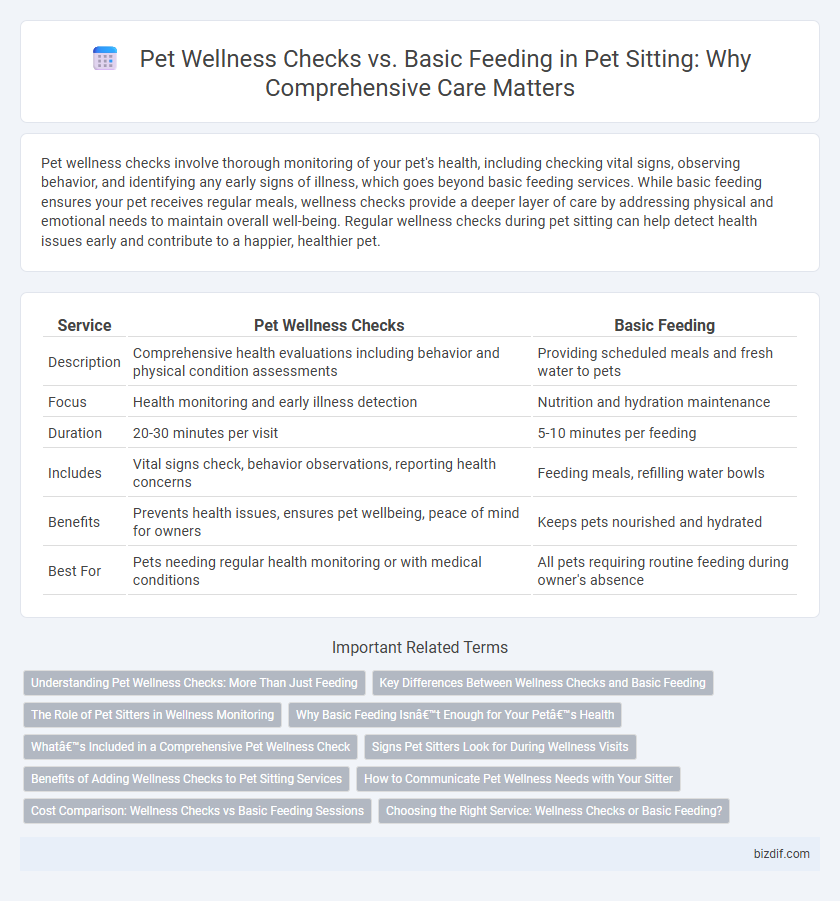Pet wellness checks involve thorough monitoring of your pet's health, including checking vital signs, observing behavior, and identifying any early signs of illness, which goes beyond basic feeding services. While basic feeding ensures your pet receives regular meals, wellness checks provide a deeper layer of care by addressing physical and emotional needs to maintain overall well-being. Regular wellness checks during pet sitting can help detect health issues early and contribute to a happier, healthier pet.
Table of Comparison
| Service | Pet Wellness Checks | Basic Feeding |
|---|---|---|
| Description | Comprehensive health evaluations including behavior and physical condition assessments | Providing scheduled meals and fresh water to pets |
| Focus | Health monitoring and early illness detection | Nutrition and hydration maintenance |
| Duration | 20-30 minutes per visit | 5-10 minutes per feeding |
| Includes | Vital signs check, behavior observations, reporting health concerns | Feeding meals, refilling water bowls |
| Benefits | Prevents health issues, ensures pet wellbeing, peace of mind for owners | Keeps pets nourished and hydrated |
| Best For | Pets needing regular health monitoring or with medical conditions | All pets requiring routine feeding during owner's absence |
Understanding Pet Wellness Checks: More Than Just Feeding
Pet wellness checks involve comprehensive health assessments including monitoring behavior, weight, hydration, and signs of illness, beyond the routine task of basic feeding. These checks help identify early symptoms of health issues, ensuring timely veterinary intervention and maintaining overall pet well-being. Regular wellness evaluations by a pet sitter contribute to a proactive approach in pet care, enhancing longevity and quality of life.
Key Differences Between Wellness Checks and Basic Feeding
Pet wellness checks involve comprehensive assessments of a pet's overall health, including monitoring temperature, heart rate, and behavior to detect early signs of illness, while basic feeding focuses solely on providing scheduled meals and hydration. Wellness checks often include administering medications, observing for any changes in pet condition, and reporting findings to pet owners or veterinarians, unlike feeding which is a routine task centered on nutrition. These key differences highlight that wellness checks provide proactive health management, whereas basic feeding addresses fundamental daily care requirements.
The Role of Pet Sitters in Wellness Monitoring
Pet sitters play a crucial role in wellness monitoring by observing pets for signs of illness or behavioral changes during regular visits, which extends beyond basic feeding tasks. Wellness checks involve assessing hydration, appetite, mobility, and energy levels to detect early health issues, ensuring timely intervention. These proactive observations contribute significantly to maintaining pets' overall health and preventing emergency situations.
Why Basic Feeding Isn’t Enough for Your Pet’s Health
Basic feeding provides essential nutrition but lacks the comprehensive attention pet wellness checks offer, such as monitoring vital signs and identifying early symptoms of illness. Regular wellness evaluations detect subtle behavioral changes and potential health issues that a simple feeding routine cannot address. Ensuring your pet's overall health requires proactive assessments beyond basic feeding to prevent serious conditions and maintain optimal well-being.
What’s Included in a Comprehensive Pet Wellness Check
A comprehensive pet wellness check during pet sitting includes a thorough physical examination, monitoring vital signs, and assessing behavior and mobility to detect early signs of illness. Basic feeding services focus solely on providing nutrition without evaluating the pet's overall health. Wellness checks also involve checking hydration levels, dental health, and skin condition, ensuring a holistic approach to the pet's well-being beyond just feeding.
Signs Pet Sitters Look for During Wellness Visits
Pet sitters conducting wellness checks focus on signs such as changes in appetite, lethargy, unusual behavior, and visible injuries that go beyond basic feeding routines. They monitor for symptoms like excessive scratching, coughing, vomiting, or abnormal bowel movements to detect early health issues. These detailed observations ensure pets receive timely care and prevent potential health complications.
Benefits of Adding Wellness Checks to Pet Sitting Services
Incorporating wellness checks into pet sitting services enhances early detection of health issues, ensuring timely veterinary care and preventing costly emergencies. Regular monitoring of vital signs, behavior, and physical condition provides peace of mind for pet owners and promotes overall pet health. This comprehensive approach supports better long-term wellbeing compared to basic feeding alone, which primarily addresses nutritional needs without assessing health indicators.
How to Communicate Pet Wellness Needs with Your Sitter
Clearly outline your pet's specific wellness requirements, including medication schedules, activity restrictions, and behavioral cues, to ensure proper care during your absence. Provide your sitter with detailed written instructions and emergency contacts, highlighting any signs of distress or illness that require immediate attention. Regular check-ins and open communication help maintain your pet's health and comfort, preventing potential complications.
Cost Comparison: Wellness Checks vs Basic Feeding Sessions
Pet wellness checks typically cost significantly more than basic feeding sessions due to the inclusion of health monitoring and preventive care assessments. Basic feeding sessions usually range from $15 to $30 per visit, while wellness checks can cost from $50 to $100 or more, reflecting the expertise and time required for thorough evaluations. Investing in regular wellness checks helps identify health issues early, potentially reducing long-term veterinary expenses compared to solely relying on feeding services.
Choosing the Right Service: Wellness Checks or Basic Feeding?
Pet wellness checks offer comprehensive health assessments, including monitoring vital signs, detecting early signs of illness, and ensuring overall well-being during pet sitting. Basic feeding focuses solely on providing timely meals and hydration, essential for daily care but lacking the medical insight wellness checks provide. Selecting between these services depends on your pet's health needs, where wellness checks suit pets with medical conditions or senior pets, while basic feeding suffices for healthy, low-maintenance animals.
Pet wellness checks vs Basic feeding Infographic

 bizdif.com
bizdif.com